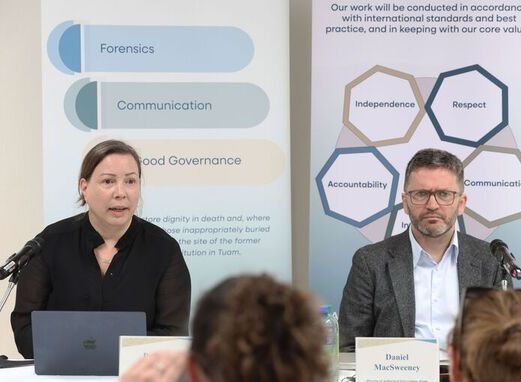John Lee had a question about culture shock for foreign correspondent Jane Ferguson.
The podcaster and his colleague Martin Nutty were interviewing the author of “No Ordinary Assignment” for the latest episode of “Irish Stew.”
And so, Lee asked whether going from a small farm in Markethill, Co. Armagh, Northern Ireland, from what she called her “young hillbilly childhood,” on a year’s scholarship to the elite prep school Lawrenceville in New Jersey had required a greater adjustment than her year learning Arabic in Yemen directly after college?
Ferguson came back with a nuanced, insightful reply to the excellent question, but you’ll have to go to irishstewpodcast.com to hear it.
The future journalist in war zones for Al Jazeera English, CNN International, “PBS Newshour” and the New Yorker magazine was born into a Protestant family in 1984. If growing up in a divided society, with its backdrop of violent conflict, was something that inevitably shaped the person Ferguson became, there was another issue that is crucial to her story: her difficult relationship with her mother.
Nutty summarized it for the listeners as the parent’s “anger issues” directed at her daughter.
Since her book was published in the summer, others have told Ferguson that they had experienced a similar type of unhappy childhood situation. She put such parental behavior down to frustration. “At the time,” the journalist said, “especially in rural communities, women didn’t have a whole lot of opportunities.”

Luckily for the young Ferguson, there was an “honorary aunt,” a best friend to her great-uncle’s wife, who became a role model and a great supporter.
Aunt Fanny had been a businesswoman, one who didn’t have a spouse or family, though she loved children. She owned a house in Belfast and a remodeled fisherman’s cottage on Tara Bay, Strangford Lough, which the young Ferguson spent summers in and where a program of activities would be arranged: expeditions with fishermen, playdates with neighborhood children, treasure hunts and scrabble. Aunt Fanny was cultured and well-read, traveled the world, was funny, chain-smoked and drank whiskey in the evenings.
“She was the most alive person, the warmest person,” Ferguson said. “She really brought a lot of the wider world into my life. She showed me an extraordinary amount of kindness.”
Fanny talked constantly to the young Jane, who recalled that she “showed me that love as a kid and really made me feel that self-worth that is important for kids to feel.”
Then when she got out of college, graduated into the financial crisis, the older woman gave her a check for £3,000, which is what allowed her to travel to Yemen.
Ferguson admitted in the interview to “looking for the most exotic and interesting and away-from-here place I could think of.” And it proved indeed the “most immersive and transformative experience.”
She might have gone to Beirut, Damascus or Cairo, but they were expensive. Yemen was the place she could best stretch Fanny’s bequest
The “Irish Stew” team discovered that “accent and identity and trying to figure out where I belong” was an issue with an interview guest who’d been told by bosses to change her accent when on screen reporting from locations like Syria and Iraq.
The County Armagh native, however, got her start in paid journalism working for an English-language newspaper in Dubai. She began as a copy editor for the sports section and soon was writing business features.
“It was quite glam and quite fun, certainly for a youngster in their early 20s,” Ferguson remembered. She had a car and a good lifestyle.
But alongside a growing sense of being “very close to where I wanted to be,” there was also panic: “This is going to be my life — this is going to be my career plateaued!”
She knew she had “to do something drastic.” And that’s why she flew to Kabul. Then this becomes a story of “growing up dreaming about something and suddenly finding yourself there.”
“There” involved, in part, “the sense of camaraderie among journalists that was like nowhere else.”
Early on, Ferguson interviewed the veteran war photographer Tim Page, who’d been sent by the U.N. to train Afghans involved in media. She was surprised that he wasn’t the “swashbuckling” type she’d expected, although he’d almost been killed on several occasions during his career, and the “interview” turned into a career-advice tutorial for her. Page stressed less what she described as the “cool factor” of war reporting and what he called the “bang bang,” suggesting instead that she “cover the country.” Ferguson is grateful now that she met him when she did; a year later, she might have developed the tendencies he warned her against.
“Irish Stew” discussed “fear as a colleague, as an ally,” terms that Ferguson uses in “No Ordinary Assignment.”
The person who’d once been an “intensely anxious kid” now heard people say “she’s so fearless” and “she’s so brave.”
At an early stage in Afghanistan, and she was there much later when Kabul fell, the journalist experienced what psychiatrists call “existential dread,” though she didn’t know the term at the time.
Ferguson explained that being able to function with fear is an absolute necessity, and that functioning entails, among other things, “doing your interviews, treating people with humanity, being polite, being organized, being aware — doing all of that without panic.”
Nutty raised the “economic” issue of survival. When the young journalist began her 14-year stint working in conflict zones, she was a freelancer without connections or an Ivy League/Oxbridge background.
“I’m not much of a plan B person, for better or for worse,” Ferguson said. She loved the work, and so she didn’t mind being broke much of the time.
In the interview, she talked about the tension between her “calling,” which involves public service to some degree, and her “ambition,” and she revealed she hasn’t found a resolution to it. In that context the podcast episode also discussed issues around for-profit and not-for-profit media outlets.
“We only scratched the surface,” Lee said at the end of the hour’s interview with the “No Ordinary Assignment” author. “It’s such a compelling read, such a rich read, It shines a light on things we should be aware of and be thinking of.”
For the interview with Jane Ferguson and other "Irish Stew" episodes, go to irishstewpodcast.com.








